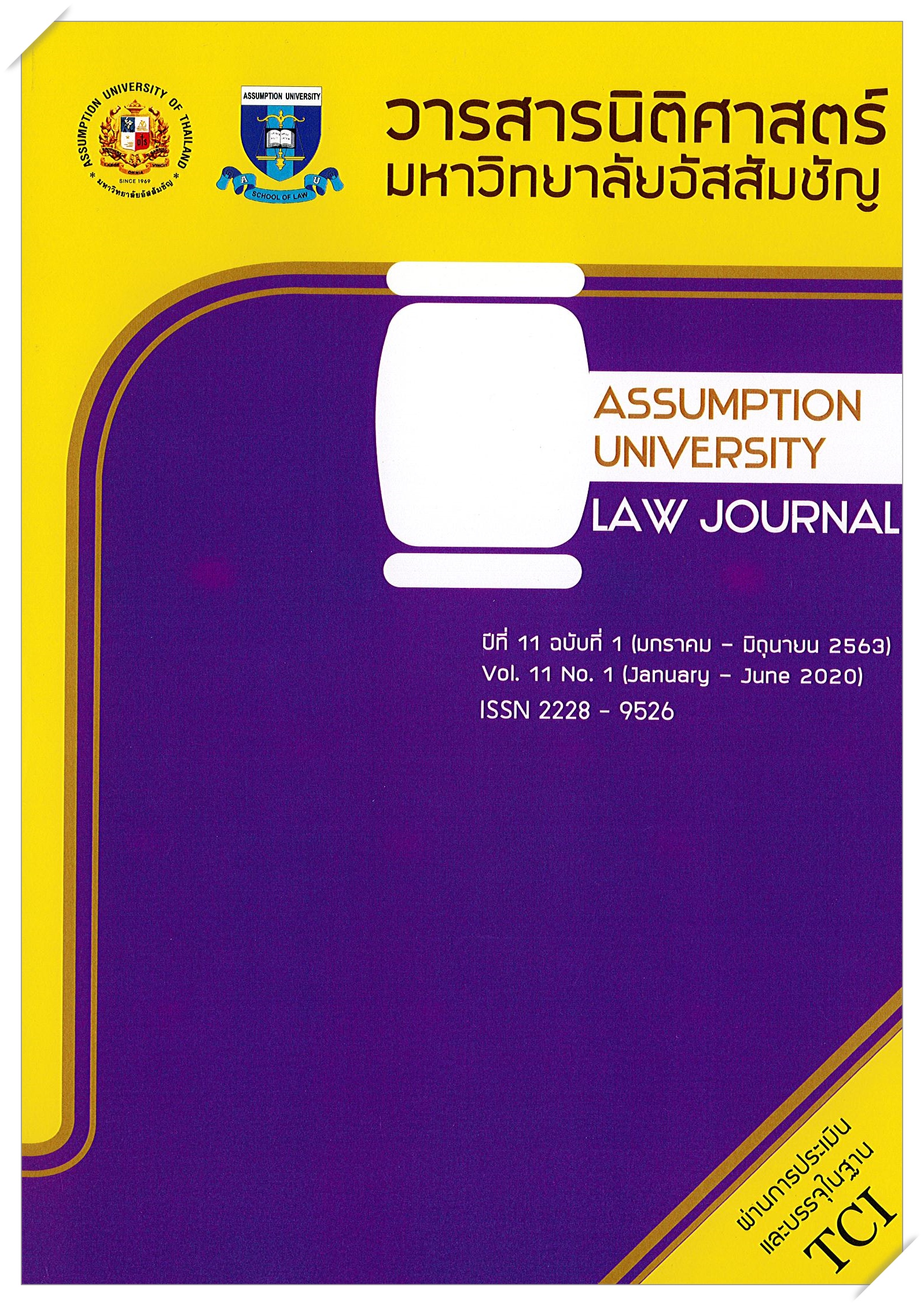ปัญหาการเป็นผู้ทรงสิทธิทางรัฐธรรมนูญของนิติบุคคลต่างประเทศ ตามรัฐธรรมนูญแห่งราชอาณาจักรไทย</br> The Problem Concerning Subject of Constitutional Rights of Foreign Juristic Person under the Constitution of the Kingdom of Thailand
Keywords:
สิทธิทางรัฐธรรมนูญ, สิทธิขั้นพื้นฐาน, ผู้ทรงสิทธิทางรัฐธรรมนูญ, นิติบุคคล, นิติบุคคลต่างประเทศ, constitutional rights, fundamental rights, subject to constitutional rights, juristic person, foreign juristic personAbstract
บทคัดย่อ
บทความนี้มุ่งศึกษาปัญหาการเป็นผู้ทรงสิทธิทางรัฐธรรมนูญของนิติบุคคลต่างประเทศตามรัฐธรรมนูญแห่งราชอาณาจักรไทย โดยเริ่มศึกษาจากแนวคิดพื้นฐานว่าด้วยสภาพบุคคลของนิติบุคคล จากนั้นจึงศึกษาข้อถกเถียงการเป็นผู้ทรงสิทธิทางรัฐธรรมนูญของคนต่างด้าว โดยศึกษาจากข้อความคิดว่าด้วยสิทธิทางรัฐธรรมนูญประกอบกับข้อถกเถียงในชั้นยกร่างรัฐธรรมนูญ ข้อถกเถียงในทางตำรา และคำวินิจฉัยของศาลรัฐธรรมนูญ เพื่อนำไปสู่การศึกษาการเป็นผู้ทรงสิทธิทางรัฐธรรมนูญของนิติบุคคลต่างประเทศต่อไป ซึ่งจากการศึกษาพบว่า นิติบุคคลต่างประเทศที่ถือเป็นบุคคลที่ไม่มีความสัมพันธ์อันแท้จริงกับรัฐเหมือนกับคนต่างด้าวนั้น สามารถเป็นผู้ทรงสิทธิทางรัฐธรรมนูญบางประเภทได้เช่นกัน โดยสิทธิดังกล่าวจะต้องเป็นสิทธิที่ทุกคนสามารถเป็นผู้ทรงสิทธิได้ และเป็นสิทธิในลักษณะเดียวกับที่นิติบุคคลในประเทศได้รับโดยไม่อาจมีสิทธิมากกว่าได้ ซึ่งนอกจากนิติบุคคลต่างประเทศจะเป็นผู้ทรงสิทธิทางรัฐธรรมนูญบางประเภทได้แล้ว ยังเป็นผู้ทรงสิทธิตามกฎหมายอื่น และได้รับสิทธิประโยชน์จากสนธิสัญญาระหว่างประเทศอีกด้วย แต่สิทธินั้นจะได้รับโดยจำกัด ซึ่งเป็นไปตามขอบวัตถุประสงค์หรืออำนาจหน้าที่ตามกฎหมาย หรือตามข้อบังคับหรือตราสารจัดตั้ง และตามสภาพแห่งสิทธินั้นจะเปิดช่องให้นิติบุคคลสามารถเป็นผู้ทรงสิทธิได้
Abstract
This paper analyzes the legal issues pertaining to the subject of constitutional rights from the perspective of a foreign juristic person under the Constitution of the Kingdom of Thailand. This paper begins by elucidating the fundamental concept of the legal personality of a juristic person, based on the concept of constitutional rights, discussions during the constitutional drafting process, academic debates and the Constitutional Court’s rulings if then analyzes a foreign juristic person’s qualifications regarding the subject of constitutional rights. The study reveals that a foreign juristic person—who is deemed a person not having a genuine link with the state, similar to an alien—can still qualify for certain constitutional rights. Such rights are those to which every person is subject; and such entitlements would not surpass those vested in domestic juristic persons. In addition to being entitled to constitutional rights, a foreign juristic person is also the subject of rights under other laws, and of certain privileges under international agreements, subject to reservation in connection with the rights to which only ordinary persons are subject and the scope of purposes, powers and duties under the laws, articles of association or memorandum of association.
Downloads
Published
Issue
Section
License
Copyright (c) 2020 Array- บทความทุกเรื่องได้รับการตรวจทางวิชาการโดยผู้ทรงคุณวุฒิ (Reader) จากภายในและนอกมหาวิทยาลัย
- ความคิดเห็นใดๆ ที่ลงตีพิมพ์ในวารสารกฎหมายคณะนิติศาสตร์ มหาวิทยาลัยอัสสัมชัญ เป็นของผู้เขียน (ความคิดเห็นใดๆ ของผู้เขียน กองบรรณาธิการวารสารกฎหมายคณะนิติศาสตร์ มหาวิทยาลัยอัสสัมชัญไม่จำเป็นต้องเห็นด้วย)
- กองบรรณาธิการวารสารกฎหมายคณะนิติศาสตร์ มหาวิทยาลัยอัสสัมชัญ ไม่สงวนสิทธิในการคัดลอก แต่ให้อ้างอิงแสดงแหล่งที่มาด้วย


